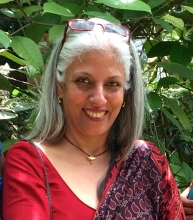
Catherine Bryson Professor of English
Ania Loomba received her BA (Hons.), M. A., and M. Phil. degrees from the University of Delhi, India, and her Ph. D. from the University of Sussex, UK. She researches and teaches early modern literature, histories of race and colonialism, postcolonial studies, feminist theory, and contemporary Indian literature and culture. She currently holds the Catherine Bryson Chair in the English department. She is also faculty in Comparative Literature, South Asian Studies, and Women's Studies, and her courses are regularly cross-listed with these programs.
Her writings include Gender, Race, Renaissance Drama (Manchester University Press; 1989; Oxford University Press, 1992) Colonialism/ Postcolonialism (Routledge, 1998; second edition, 2005; third edition 2015; Italian, Turkish, Japanese, Swedish and Indonesian editions) and Shakespeare, Race, and Colonialism (Oxford University Press, 2002). She has co-edited Post-colonial Shakespeares (Routledge, 1998); Postcolonial Studies and Beyond (Duke University Press, 2005), Race in Early Modern England: A Documentary Companion (Palgrave, 2007) and South Asian Feminisms (co-edited with Ritty A. Lukose, Duke University Press, 2012) [http://southasianfeminisms.wordpress.com]. She is series editor (with David Johnson of the Open University, UK) of Postcolonial Literary Studies (Edinburgh University Press). She has also produced a critical edition of Shakespeare's Antony and Cleopatra (Norton, 2011) [http://books.wwnorton.com/books/Antony-and-Cleopatra]
Her latest publications include Rethinking Feminism in Early Modern Studies: Gender, Race and Sexuality (co-edited with Melissa Sanchez; Routledge, 2016) [https://www.routledge.com/Rethinking-Feminism-in-Early-Modern-Studies-Gender-Race-and-Sexuality/Loomba-Sanchez/p/book/9781472421753]; essays on early modern global contact; on race and embodiment; caste and its implications for understanding racial philosophies, and race in modern India.
Her forthcoming book, Revolutionary Desires: women, communism, and feminism in India (Routledge 2018), explores the histories and subjectivities of militant-nationalist and communist women from the 1920s till the late 1950s. It traces how they shaped a new political and feminist subject, in collaboration as well as contestation with mainstream nationalist, liberal-feminist, and European left-wing models of womanhood. Also forthcoming is an edited collection A Cultural History of Western Empires in the Renaissance (Bloomsbury, 2018).

 The Program in Gender, Sexuality, and Women’s Studies
The Program in Gender, Sexuality, and Women’s Studies